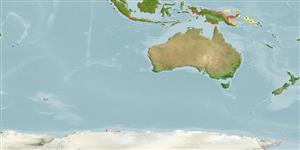Environment: milieu / climate zone / depth range / distribution range
Ecology
Marine; freshwater; brackish; pelagic-neritic; non-migratory. Tropical; 2°S - 10°S
Southwest Pacific: known from several sites but probably extends from Toro Pass near the mouth of the Fly River (Papua New Guinea) to Vogelkop Peninsula, Irian Jaya, and from Woods Inlet in Darwin Harbor, Australia.
Size / Weight / Age
Maturity: Lm ? range ? - ? cm
Max length : 3.5 cm TL male/unsexed; (Ref. 9786)
Found in mangrove swamps and saline creeks (Ref. 9786, 44894). Occurs infringing coastal mangroves in brackish or marine waters. Aggregations shelter among submerged roots or inundated leaves and branches (Ref. 44894). This is a planktivorous species which adapts well to freshwater environment. May occur in large schools, frequently in muddy waters. Sympatric with P. cyanodorsalis over part of its range (Ref. 9786). Probably more widespread, but has escaped notice due to its small size and largely inaccessible habitat (Ref. 44894).
Life cycle and mating behavior
Maturity | Reproduction | Spawning | Eggs | Fecundity | Larvae
Ivantsoff, W., 1999. Order Atheriniformes. Pseudomugilidae. Blue eyes. p. 2109-2112. In K.E. Carpenter and V.H. Niem (eds.) FAO species identification guide for fishery purposes. The living marine resources of the Western Central Pacific. Volume 4. Bony fishes part 2 (Mugilidae to Carangidae). FAO, Rome. (Ref. 9786)
IUCN Red List Status (Ref. 130435: Version 2024-2)
Threat to humans
Harmless
Human uses
Fisheries: of no interest
Tools
Special reports
Download XML
Internet sources
Estimates based on models
Preferred temperature (Ref.
123201): 27.9 - 29.1, mean 28.7 °C (based on 249 cells).
Phylogenetic diversity index (Ref.
82804): PD
50 = 0.5000 [Uniqueness, from 0.5 = low to 2.0 = high].
Bayesian length-weight: a=0.00389 (0.00180 - 0.00842), b=3.12 (2.94 - 3.30), in cm total length, based on all LWR estimates for this body shape (Ref.
93245).
Trophic level (Ref.
69278): 3.4 ±0.45 se; based on food items.
Fishing Vulnerability (Ref.
59153): Low vulnerability (10 of 100).
